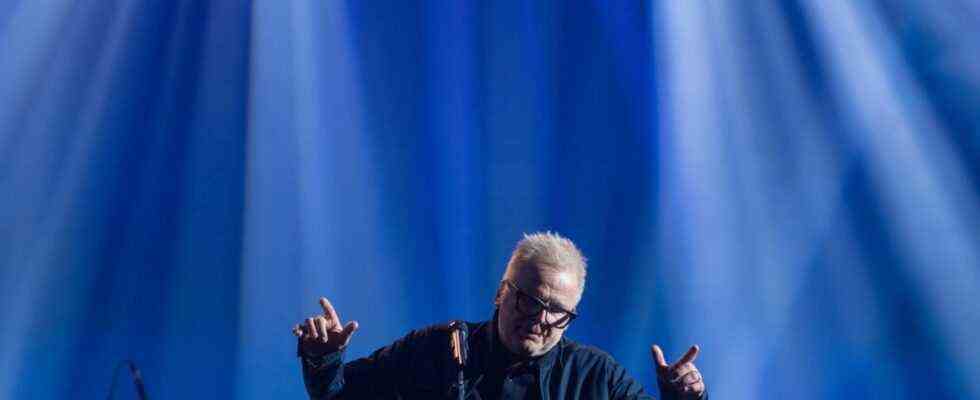Before the young woman from Dernau tells how much everything is in the ass, red hearts fly. The mud words meet a studio that is upholstered with a lot of feeling. Roland Kaiser stands with a checkered pocket square in front of the LED wall that shines with symbols of love and peace and sings: “Love can save us, free us from all chains.”
All ARD radio waves have been broadcasting the donation hotline since 7 a.m., a reminder of the flood disaster in West Germany, of the money that people now need. The highlight of the evening was the show under the motto “We hold together” from Cologne, Leipzig and Hamburg with artists, some of whom have long been lost: Jeanette Biedermann, Yvonne Catterfeld, Sarah Connor, Peter Maffay, Roland Kaiser, Die Prinzen, Max Mutzke and , yes, with his first appearance this year: Herbert Grönemeyer.
Things could go wrong in such an evening when injured, traumatized people talk about their still very fresh suffering. Where flood victims like the woman from Dernau tell of their houses washed away, in which heavily built men burst into tears in front of the camera and understand nothing, except that they just happened to find their wedding ring in the mud. Because the evening should of course not only celebrate suffering, but also has one goal: money. Presenter Janina Ullman put it very dryly at the beginning of the program: “Open your heart. And above all: open your wallets.” And it is also up to artists like Sarah Connor and Herbert Grönemeyer that when switching back and forth between helpers, rubble people, Eckart von Hirschhausen and Peter Maffay, there is hardly any dizziness.
And it is up to the singer Alexander Klaws, a man to whom, as a grandsonless countess, you would without hesitation bequeath the castle on Lake Starnberg. The dream son-in-law sits with other celebrities in the switchboard in Hamburg, beaming and ready to receive the callers’ open wallets.
Ingo Zamperoni has the most difficult part of the evening. He moderates in a crazy rhythm between “Doomsday mood to the high ten”, as a flood victim put it in the studio, shocked helpers who rescued people from roofs, still stunned emergency services who were drilling high-risk dams so that the water could flow away, a sensitive psychologist who Comparing conditions in Ahrweiler with war experiences and a completely overheated Eckart von Hirschhausen, who wants to find the clearest words again and says: “The shit is steaming.” Ingo Zamperoni, anyway a man of the finer language, moderated the fate marathon very confidently and promptly cools down Hirschhausen’s words: “Mmm, we’ve heard that a few times too.”
He switches from real suffering to the staging in Leipzig – and that is always delicate in the face of a disaster. The candles that burn in front of the stage for the victims look stylish. The many spray fountains between which Jeanette Biedermann undertakes vocal hikes to 8000ers, sings about “10,000 questions” that “beat in the head and heart” and black and white images are cut in slow motion of people on excavator shovels seem less stylish.
Not all artists get through the valley between self-marketing performance and honest sympathy. Max Giesinger’s apocalypse pop, including wink and index finger poses, doesn’t necessarily hit the right note. Most of them, like Sarah Connor, manage to be sincere this evening surprisingly well. And when the princes sing that they will fight for you, carry you across the water so that you can always count on them, the audience is so moved that it sways gently back and forth.
Udo Lindenberg’s strong lower lip should of course not be missing from this “all-star line-up”, as Zamperoni put it. Udo is not present, but presents a painting from Hamburg with a crisis nose that he has just finished. The art-loving viewer can bid for the picture of him on a ship between women with large breasts.
And shortly before the end, before Zamperoni announces the donation level of over 16 million euros, Herbert Grönemeyer is actually sitting in the leather armchair with thick black horn-rimmed glasses. “I think people are still in shock,” he says. And when he finally reveals which song he is about to play, and the presenter wants to direct him to the sad story behind it, Grönemeyer takes a fine step in the face of the catastrophe. He wants to reel off what has been told so often when he interrupts himself and says: “Oh, that’s not interesting now.”
Then he is on stage with his boys, who have matured 20 years together with the song, and grönemeyert about “Mensch”.
And in the end you have to say: it’s okay.

